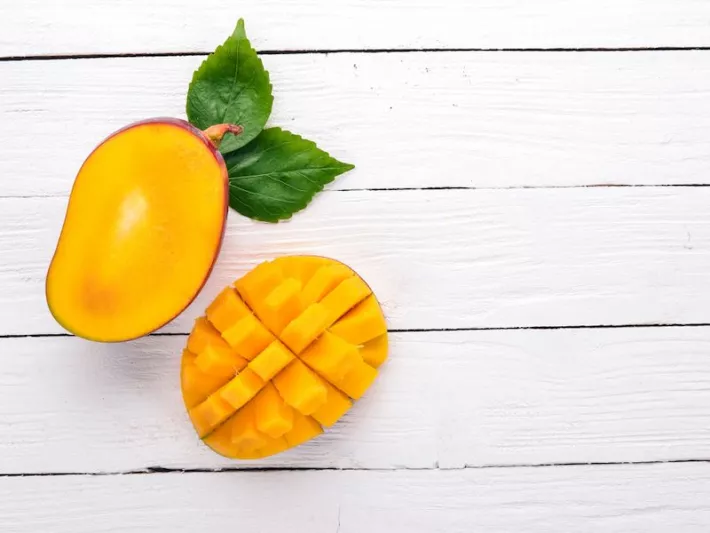Here’s an interesting question from a Grammar Girl podcast listener:
“Hey, Grammar Girl. I have what I think is a familect story, but it could be just a local idiom. I’m not really sure at this point. I grew up in Eastern Ohio where we have a really odd dialect, but my family growing up always used the word ‘mango’ to mean a green pepper. So I didn’t know that mangoes were a fruit and a tropical fruit at that. Well, fast forward two years later when my nephew was having his first birthday party, and my husband and I had discovered that mangoes are indeed delicious tropical fruits and that mango ice cream is really tasty, so we ordered an ice cream cake for the family, and we ordered it with mango ice cream, and my father was appalled. He said, ‘I know you eat some weird things but mango ice cream?’ and then I realized that my father was thinking it was green pepper flavored ice cream. Not quite! But I never knew where the word ‘mango’ came from in that sense, and my family has never been able to figure out why we and other people around us called green peppers mangoes.”
Thank you! I had heard about this before, but had forgotten about it until I got your message. People in what linguists call the West Midland region do sometimes call green peppers “mangoes” or “mango peppers.” It seems to be most concentrated in Illinois, Indiana, and, like where our caller is from, Ohio. Although it’s occasionally heard in other nearby states too.
The story is that long ago, mangoes seems to have been a term more generally used for fruits that were pickled. And yes, as an aside, peppers are technically fruits, not vegetables.
One theory is that when mangos were first imported from India, they had to be pickled to make the journey, and by association, some people started using the term “mango” to refer to any fruit that was pickled.
A different story uncovered by Indianapolis Star food writer Donna Segal is that in England in the 1700s, “there was a demand for Indian-style pickles like fruit mangos stuffed with spices and kept in a vinegar brine.” But at the time, mangoes had to be grown under glass in England so they weren’t widely available, and cooks began using green bell peppers instead.
Mangoes weren’t widely available, so cooks swapped in green bell peppers.
Apparently, Brits who traveled to India were enthralled by mangoes. For example, according to Jane Grigson’s Fruit Book, John Fryer, a surgeon for the British East India Company in the late 1600s, returned to England and wrote that “the apples of Hesperides were nothing but fables to a ripe mango—for taste, the nectarine, peach, and apricot fall short.”
It’s hard to imagine that a green bell pepper could adequately substitute for a mango, but that’s the story I found in more than one source, and supposedly when English cookbooks were printed in America, they spread the concept of calling green peppers “stuffed mangoes.”
You can easily find recipes for ‘mangoes’ that call for red or green peppers.
On Google Books, you can easily find recipes from the late 1800s and early 1900s for “mangoes” that call for red or green peppers and other fruits. For example, The Housekeepers’ and Mother’s Manual from 1895 has recipes in its pickling section for pepper mangoes, melon mangoes, and peach mangoes, which are pickled peppers, pickled melons, and pickled peaches.
The Oxford English Dictionary has an example that reads “The peaches may be converted into excellent mangos,” and it even shows that “mango” was used as a verb in the late 1700s to describe pickling something. The example sentence is “To mango Cucumbers. Cut a little Slip out of the side of the Cucumber.” [Also, check out the interesting capitalization in the example. The late 1700s were a time when we still capitalized all nouns in English.]
People who travel to or move to the West Midland region comment on the strange name for green peppers. According to Dawn Mitchell in an article the IndyStar, “Grocery stores [in the region] tried to appease both camps by advertising ‘green mango peppers.’”
Thanks again for the question that sent me on the hunt of this neat regionalism that ended up letting me imagine 17th century British nobles growing mangoes under glass.
Image courtesy of Shutterstock.
Mignon Fogarty is Grammar Girl and the founder of Quick and Dirty Tips. Check out her New York Times bestseller, “Grammar Girl’s Quick and Dirty Tips for Better Writing.”




